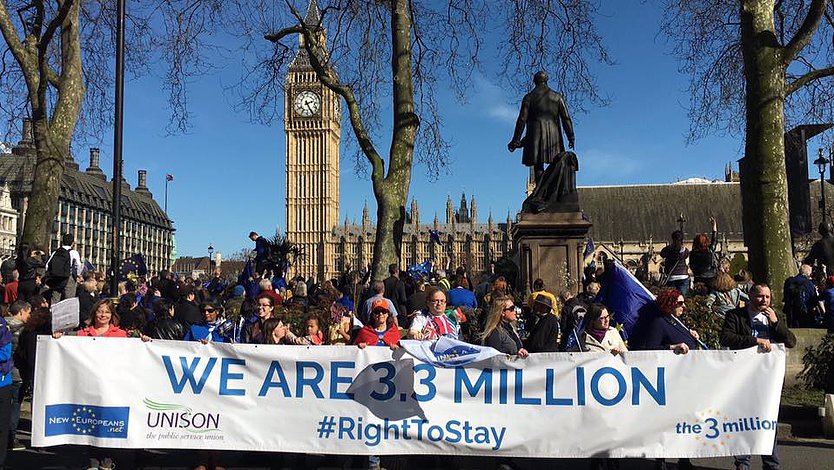 The UK has belatedly published plans for EU citizens living in the UK to apply for settled status. But most other EU countries have paid little attention to what will happen to the UK citizens living within their borders. Aliyyah Ahad (Migration Policy Institute Europe) says that many are living in limbo, unsure of what their residency, health and pension entitlements will be. Member States have a duty to reach out to them.
The UK has belatedly published plans for EU citizens living in the UK to apply for settled status. But most other EU countries have paid little attention to what will happen to the UK citizens living within their borders. Aliyyah Ahad (Migration Policy Institute Europe) says that many are living in limbo, unsure of what their residency, health and pension entitlements will be. Member States have a duty to reach out to them.
Peter sold up and moved to France to retire more than three years ago; Alex is just finishing secondary school in Spain. They have very few things in common – only that they are both British citizens, and that the risk of a no-deal Brexit is causing them and their families serious anxiety. They face the kind of fundamental legal and social issues – access to essential services, right to family reunification – that policymakers should be agonising over. Yet details of how governments plan to address these issues are only emerging slowly, if at all.

In June, two years after the Brexit referendum, the Home Office outlined how citizens of EU countries will be able to apply for so-called settled status. The home secretary then said it was “not good enough” that other Member States had not published reciprocal arrangements for British nationals in the EU27. According to the chair of British in Europe – a citizens’ rights organisation – the UK government’s display of concern was “a bit late and a bit rich.”
From the outset of Brexit negotiations, most of the media and political attention in this area has focused on the status of the nearly three million EU27 nationals living in the UK. During interviews the Migration Policy Institute Europe conducted last autumn, European policymakers often expressed more concern for their nationals in the UK than for their own British residents.
UK citizens in the EU27 – who numbered roughly 900,000 at the last European census – have been left blowing in the wind, with few hints of the processes, evidentiary requirements and fees they may face as they become nationals of a non-EU state.
Member States have many policy options to avoid inflicting damage on the most vulnerable of their own British residents, but their policymakers are more focused on helping their business communities to manage the potentially abrupt change in trading status with the UK. The Netherlands and Belgium are hiring several hundred new customs staff, but there is no news yet on how many more immigration officials will be needed to manage British nationals’ dossiers. European leaders are only slowly waking up to the monumental task before them. In Germany the government is working on a law that will prolong UK citizens’ access to dual nationality. More recently the French government called on its ministers to prepare contingency measures for UK citizens in case of no deal.
This is a start, but it does not go far enough. Britons still know precious little about what plans will be put in place if there is a deal. As part of Migration Policy Institute Europe’s research in this area, we will soon publish two case studies focusing on pensioners and families – two groups that have been largely forgotten in the current discussions.
Chief among their concerns are residency rights. Peter, for example, was not obliged to register when he moved to France, and now he worries that he will struggle to prove his legal residency if UK citizens are suddenly subject to the same procedures as non-EU nationals. He has looked for advice from local authorities, but they tell him only that “nothing has changed.”
For Alex, whose parents moved to Spain when she was ten years old, the big question is whether to apply for Spanish citizenship. She has no idea where she will want to live or study when she gets older and does not want to lose her right to free movement in the EU. Under the draft withdrawal agreement, UK citizens will only retain existing rights within their current Member State of residence. Those who provide cross–border services or want to work, study or live in another Member State will lose their rights to do so.
However, naturalising in another EU Member State is not a silver bullet. Due to Spain’s restrictions on dual nationality, Alex would have to renounce her British citizenship, potentially making it more difficult for her to return later. She is also unsure if, after losing her British citizenship, she will still fall within the scope of the withdrawal agreement. Its provisions on family migration, for example, are often more favourable than Member States’ national legislation for both citizens and nationals of non-EU states, particularly regarding visa–free entry for future spouses and waivers for language and income requirements.
In a recent report, Next Steps: Implementing a Brexit Deal for UK Citizens Living in the EU-27, MPI Europe investigated the measures taken by policymakers to stop vulnerable groups from falling through the cracks. The report encouraged policymakers in the UK and EU to make contingency plans now to protect those most at risk—by updating websites to reflect the negotiations, giving clear guidance in English on the proofs they might need to change their status and what deadlines they could face.
Where registration systems do not currently exist, or where under-registration is believed to be a problem, authorities should start outreach now – both digitally and in person. Member States with restrictions on dual nationality should also make it clear to British nationals how they could be affected by adopting their host country’s citizenship.
Residency rights are not the only worry for people like Peter and the roughly 190,000 British pensioners living elsewhere in the European Union. For example, they must consider whether they will be able to access the health system after Brexit. Peter is generally in good health, but he knows that he could need access to emergency medical care at any moment and cannot afford to pay out of his own pocket.
Most worrisome of all, if the UK and EU cannot find an agreement on provision of cross-border financial services, Peter’s UK-based private pension scheme would be forced to stop payments. Without this income, his life in France would become untenable. These concerns are shared by all UK citizens in the EU27 but are compounded for pensioners, adding to the challenges of social isolation, long-term health conditions and, for some, declining cognitive capacity.
The proportion of pensioners among those who will be covered by the UK-EU withdrawal agreement will only grow, making it vital to ensure that both the final deal and application processes for a post-Brexit status reflect the potential vulnerabilities of this group. If they do not, thousands of UK citizens could find themselves forced to return to the UK in a desperate situation – even without the doomsday scenario of the United Kingdom crashing out of the EU without any form of deal.
This is not solely the burden of national and local authorities. The European Commission has already published nearly 70 Brexit notices on topics ranging from animal feed to waste law. Protections for British citizens – particularly pensioners – should not be left to chance, either.
This post represents the views of the author and not those of the Brexit blog, nor the LSE. This research was made possible by funding from the Barrow Cadbury Trust.
Aliyyah Ahad is an Associate Policy Analyst with MPI Europe, where her research focuses on European migration and integration policy.







The problem here is that the Brexit talks have been held up by Tory infighting.
There has been no agreement by the Tory Party on what detailed final relationship it wants with the European Union, apart from May’s ghastly compromise of half-in half-out of the Single Market, which satisfies no-one, either in the UK or in the EU27.
Because there is no agreement on the final form of the future EU27/UK relationship, the preceding Withdrawal Agreement, which would clarify citizen rights in the UK and EU 27, is also held up. EU27 countries, acting together as they have been, are reluctant to proceed on citizen rights until they get the go-ahead from Brussels.
Stop sitting on the fence, Theresa May. Is the UK to be inside or outside the Single Market?
“Most worrisome of all, if the UK and EU cannot find an agreement on provision of cross-border financial services, Peter’s UK-based private pension scheme would be forced to stop payments.”
Is this actually true? According to this page https://www.bbc.com/news/business-45296001 “Pension companies could pay people living in the EU into a UK bank account”, so Peter will still get his private pension if he can get access a UK bank account. Of course this means additional botheration, but it doesn’t seem like an insoluble problem.
Correct, as long as the UK does not depart SWiFT, Peter will be fine if he has a UK bank account that his pension can be paid into; then he just needs to set up a standing order.
As for other issues such as medical coverage one has to imagine that the EU will apply reciprocity to those entitlements that settled EU citizens would enjoy in the UK. Not to do so would be a huge PR gift to HMG and the Brexiteers